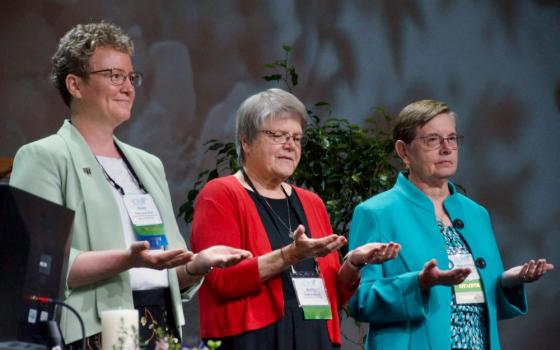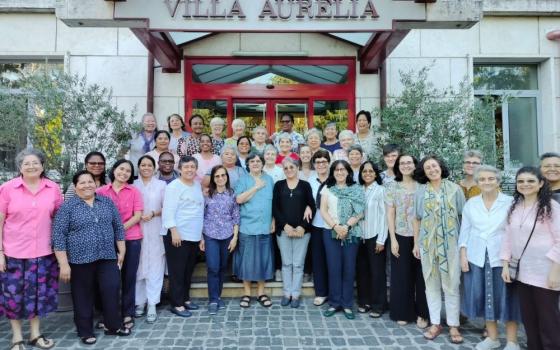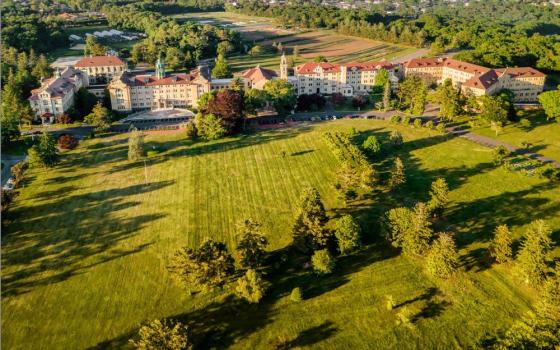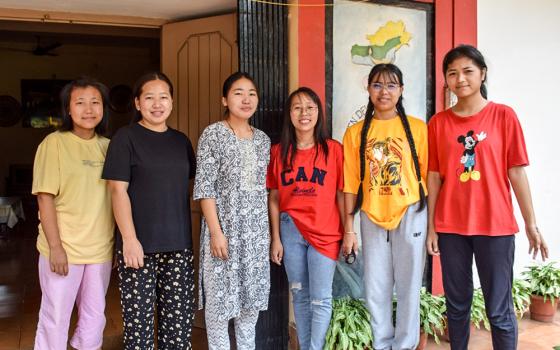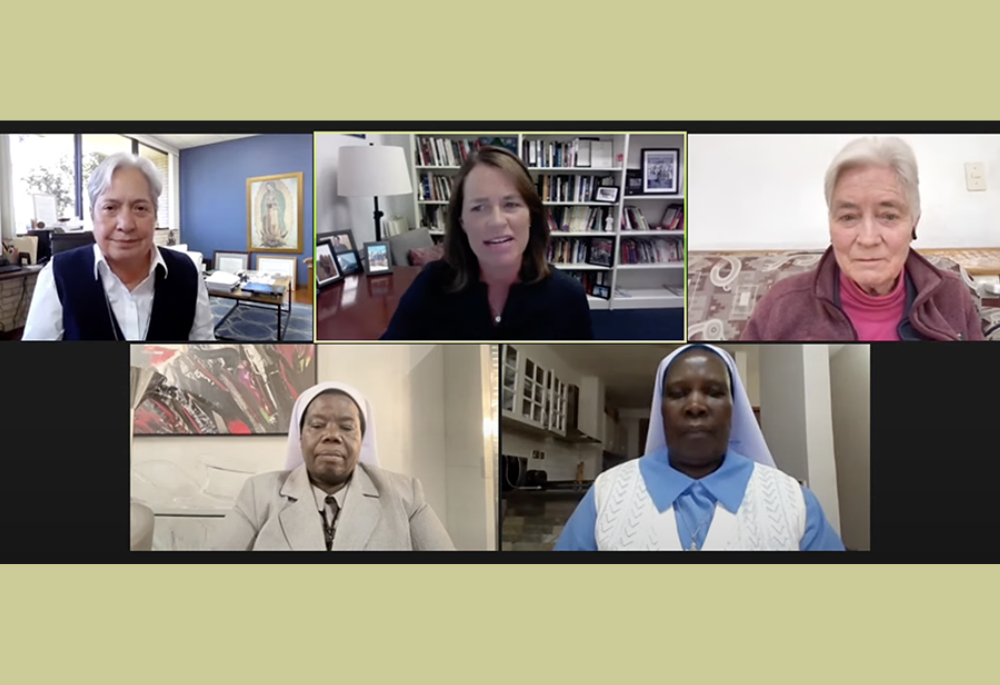
Participants in the Sept. 14 Georgetown University public dialogue included, clockwise from top left: Missionary of Jesus Sr. Norma Pimentel; Kim Daniels, director of Georgetown's Initiative on Catholic Social Thought and Public Life; Maryknoll Sr. Patricia Ryan; Sr. Pauline Acayo of the Little Sisters of Mary Immaculate of Gulu, Uganda; and Sr. Rosemary Nyirumbe of the Sisters of the Sacred Heart of Jesus in Gulu. (Screenshot/Courtesy of Georgetown University)
The moderator got it right.
"Catholic social teaching calls us to stand in solidarity with the poor and vulnerable to advance justice and the common good to protect human life and dignity," Kim Daniels said during an online public dialogue last week.
But here's the catch: Too often, "conversations around these topics can seem abstract," said Daniels, who directs Georgetown University's Initiative on Catholic Social Thought and Public Life and who moderated the Sept. 14 event.
In order to make the conversation concrete, Daniels said, it is important to focus on the "living examples of Catholic social teaching in action." And who better to do that than four sisters who are exemplars of the forum's theme, "Catholic Sisters Living the Church's Social Mission: Signs of Hope." (The event is available for viewing on YouTube.)
The dialogue was co-sponsored by the Georgetown University Berkley Center for Religion, Peace, and World Affairs and supported by the Conrad N. Hilton Foundation, which is a funder of Global Sisters Report.
The participating sisters — all working in challenging and demanding environments — are well-known to readers of Global Sisters Report. As the Berkeley Center details:
- Sr. Pauline Acayo of the Little Sisters of Mary Immaculate of Gulu has worked for Catholic Relief Services since 1998, and now directs the Strengthening the Capacity of Women Religious in Early Childhood Development program in Kenya.
- Sr. Rosemary Nyirumbe of the Sisters of the Sacred Heart of Jesus in Gulu, Uganda serves as the director of St. Monica's Girls' Tailoring Center in northern Uganda. There she works with women and girls who have survived violence due to ongoing civil war and conflict.
- Missionary of Jesus Sr. Norma Pimentel is the executive director of Catholic Charities of the Rio Grande Valley and head of its Humanitarian Respite Center. The center assists families who have fled Central America — work that has earned Pimentel recognition from Pope Francis.
- Maryknoll Sr. Patricia Ryan, a social justice and human rights advocate, has lived and worked in Peru since 1971. Her ministry has included advocacy for environmental justice and work with Indigenous farmers in the Andes mountains.
Typical of the comments of the four sisters was Pimentel's response to the question of how laity can learn from the example of sisters. Pimentel said, "Sisters are out there radically living the Gospel every day." But she added, "We must all do that."
Advertisement
Pimentel recalled an incident in which a woman who was steadfastly opposed to assistance to those she called "illegal aliens" came to a shelter in Brownsville, Texas.
"The fact that she told me she was against what I was doing gave me the opportunity to shift and tell her, 'Look, let me show you what I do and why.' When I did that, her whole thought of why she was against [assistance] completely dismantled and she said, 'You know sister, I am 100% in favor of what you are doing.' " It didn't matter anymore, Pimentel said, that "these people were, according to her initially, 'illegal aliens.' All of a sudden, they became persons. They became people. I think that is what brings us together."
Further excerpts from the conversation follow:
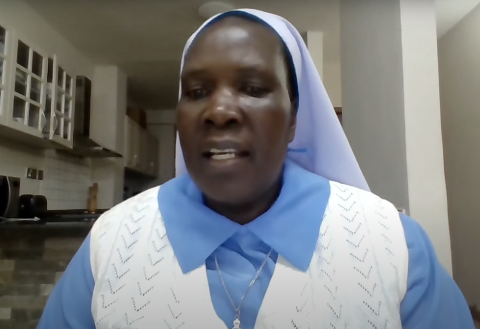
Sr. Pauline Acayo speaks at a Sept. 14 public dialogue, "Catholic Sisters Living the Church's Social Mission: Signs of Hope." (Screenshot/Courtesy of Georgetown University)
Sr. Pauline Acayo: Asked how she views her vocation, Acayo said that she feels the "direct spirit of God" and that such spirit "protects our ministries amidst confusion, conflict or moral decay." Counseling children affected by war and reintegrating them into the community are examples of "self-giving" and also work of "commitment and collaboration" with partners and community stakeholders. In such work, she said, she and others feel "God's guidance every day."
A cornerstone of Acayo's work — in committing herself "to the life to serve God and his people" — is in "giving life to the hopeless, those in need and being the voice of the voiceless and, most of all, empowering the most vulnerable in the community."
This is all rooted and grounded, Acayo said, in the principles of Catholic social teaching, which she said "calls us to be attentive to the needs of the poor, and care for the hurt and defend and promote the dignity of the human person and to help spiritual and material needs." She added: "Catholic social teaching is the foundation for our guiding principles."
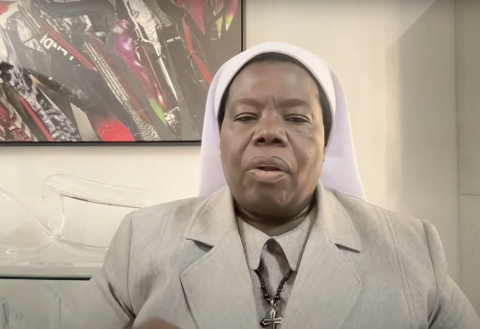
Sr. Rosemary Nyirumbe speaks at a Sept. 14 Georgetown University public dialogue. (Screenshot/Courtesy of Georgetown University)
Sr. Rosemary Nyirumbe: Nyirumbe said when she first arrived at her mission in northern Uganda she had to "read the signs of the times" and respond to the needs of "vulnerable women and children who are escaping from rebel captivity." She said she had to "think about what would be done in order to mend their brokenness, in order to show them the path of tomorrow — the future of hope."
For that reason, she said, she had to create programs from scratch. "I had to become active, innovative and make sure I lead by example. Of course, many times when we ascend as sisters we always think of the job descriptions. [But] I found the job description was not working for me. I had to create my job description … [to] create different activities and lead by example."
Asked about balancing her ministry with her spiritual life, Nyirumbe said she believes it is important to keep all together and to do so within the larger life of her community. "That means what I am doing must align with the cause of my congregation," she said, "caring for the poor, working with the vulnerable and caring for orphans and refugees."
She added: "That is what brings me the balance. I am not doing anything outside of what my congregation requires. For me, that's exactly the balance. That is my spiritual path."
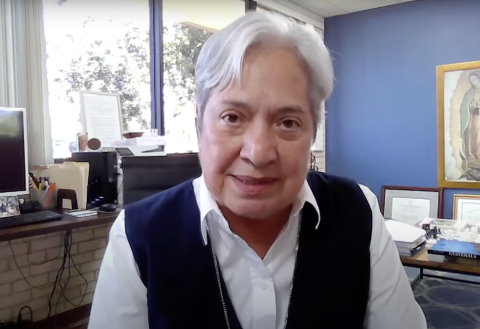
Sr. Norma Pimentel speaks at a Sept. 14 Georgetown University public dialogue. (Screenshot/Courtesy of Georgetown University)
Sr. Norma Pimentel: Pimentel said that from her experience and those of other sisters, it is "important that our presence is a visible presence of the love of God for his people," being present "so that we can empower others to have the confidence they need to move forward in doing good. To be able to be involved in care for others. To care for one another."
Pimentel said she realizes that her ministry in helping immigrants and refugees (or migrants) comes at a moment when the United States is now "a very divisive and polarized country" about immigration immigrants and that "many are fearful of the fact that so many people migrate to the United States."
"It becomes very controversial as to whether we should respond to help," she said. "I always say, 'We are hijacked by the political platforms that try to build a narrative that brings fear to us and to many of the people here in our country.' "
One thing that religious like herself "hold closely" is the belief in "defending humanity. Protecting life. Being present to those who are hurting and suffering" and need basics like water and food and shelter. Their lives matter, Pimentel said.
"We have a responsibility to one another. We have a responsibility to humanity and to care. That is a God-given call to all of us to care for one another. And to defend human dignity and respect human life," she said.
Pimentel said she tries to steer clear from "the political, the force that is trying to destroy" as well as trying "not to be distracted."
Her centeredness "needs to come from God."
"God needs to be the force that pulls me forward and sustains me in one direction which is the love and care of others," she said.
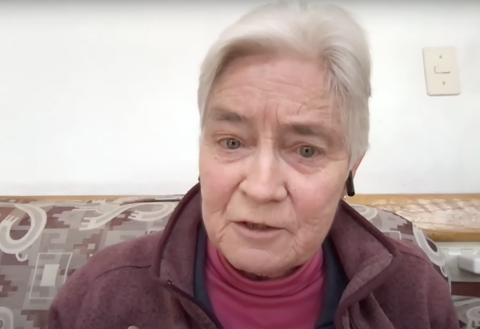
Sr. Patricia Ryan speaks at a Sept. 14 Georgetown University public dialogue. (Screenshot/Courtesy of Georgetown University)
Sr. Patricia Ryan: Asked how she views the vocation of sisters, Ryan said certain elements — three in all — must mesh together. One is the preferential option for the poor — of living and working and joining with the poor. "You have to walk together. That option is not optional. It's an essential part of our commitment as Christians. We can't put it aside and say we may not be involved with that. It is who we have to be as Christians."
The second dimension, she said, would be "the care for our common home. We call her mother Earth and (on whom) our lives depend." Citing the second creation story in the Book of Genesis, which Ryan said is aligned with Francis' thinking on the earth, Ryan said the biblical mandate "calls us to care for the earth and cultivate the earth as our home. Our common home. We have to protect her."
The third dimension is respect for "the nonviolent option" in dealing with conflicting situations. "Knowing there's a way that is nonviolent that can be created," she said. "We have to be a part of creating that new way of approaching life and approaching conflict in a way that is not going to cause violence or death."
Asked about sisters' presence in the communities in which they live and work, such as the Indigenous communities in Peru, Ryan said, "Our presence makes visible God's love. And being present with people [becomes] a mutual celebration of our spirituality" of both the community members and the sisters. All are "joined together in moments of great joy as well as great sorrow. It's being there and being part of those celebrations and part of the grief, too. Your life becomes one."

